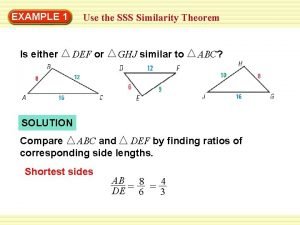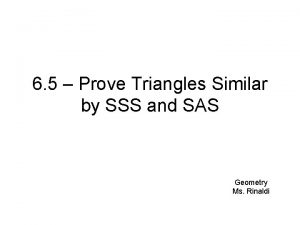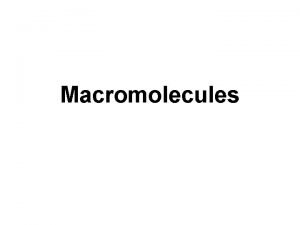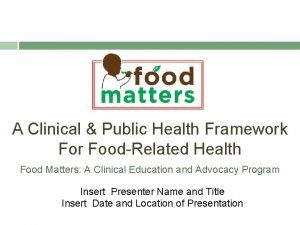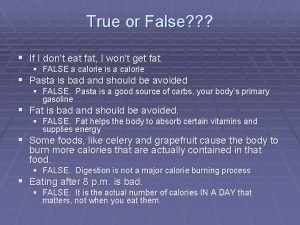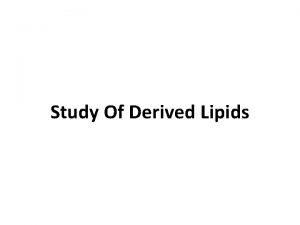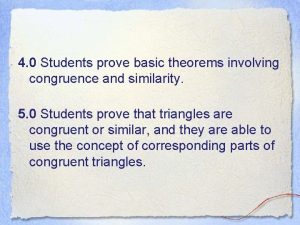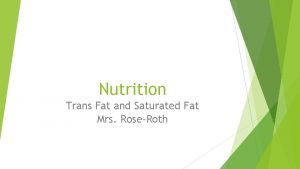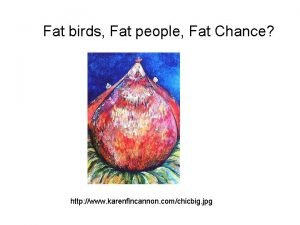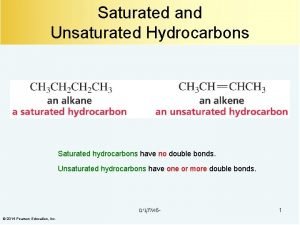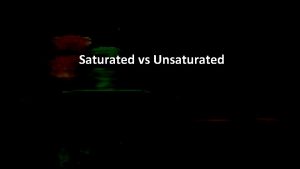Saturated fat tax Saturated fat tax Side 2













- Slides: 13

Saturated fat tax

Saturated fat tax - Side 2 The tax is DKK 16 per kilo saturated fat The tax enters into force October 1 st 2011

Taxable products (2. 3 % saturated fat) – – – Dairy products under codes 0401 - 0406 Animal fat which is melted off or extracted in other ways, under codes 1501 -1504 and 1516 Edible oils under codes 1507 -1516 Margarine and other food under code 1517 Spreadable products under position 2106 Other foods which are comparable with the above taxable food Products for ”non-food” will be exempted Side 3

Average content of saturated fat in meat Product Meat Beef Pork Sheep and goat meat Horse, mule, donkey Chicken, poultry and wild fowl Duck and goose Turkey Rabbit and hare Other game Other meat Side 4 Saturated fat Tax per 100 g per kg 5. 2 6. 5 6 4 2. 5 12. 1 0 0 1. 6 4. 2 0. 83 1. 04 0. 96 0. 64 0. 40 1. 94 0. 00 0. 26 0. 7

Products not included Products with saturated fat content at or below 2. 3 % are not included in the tax As a consequence, standardized drinking milk, yoghurts, animal species below 2. 3 % saturated fat content are exempted from the tax Meat is to be taxed on the basis of the meat content using the average standards of saturated fat in the individual animal species Side 5

Products not included Fresh cuts of meat sold to the retail sector below 2. 3 % saturated fat will be exempted from the law – e. g. fresh cuts of meat intended for direct sale to the consumer Composite products will be taxed on the basis of the raw meat used for processing and the average standards of saturated fat in the individual animal species Consequently, all composite meat products will be taxed regardless of the fact that they contain less than 2. 3 % saturated fat Side 6

Taxable parties - Side 7 Taxable parties are to tax food other than meat on the nutrition labelling, if the food is marked with such Taxable parties can also determine saturated fat content for products other than meat based on publically available food information Taxable parties can, however, also choose to settle the tax to be paid for other food than meat based on a technical analysis of the food, receipts, declarations etc.

Taxable parties are, in principle, to use the average rate for saturated fat for the different meat types The taxable parties can - however - choose to determine the tax on cut level for meat, which is supplied packaged to retail stores (binding for one year) - Taxable parties can choose to use the publically available food information available on raw and unprocessed meat cuts Carry out a specific analysis of the fat content in the cut The taxable parties are to deduct 27. 5 % of the tax for pork and 25 % of the tax for other meat types – e. g half, quarter or sixth of animals sold to local butchers Side 8

Imported composite products Tax is to be paid on the amount of saturated fat which is used in the production of the imported composite product Side 9

Special regulation The tax can be settle based on the product’s total fat content or ultimately on the product’s net weight The national authorities can estimate the coverage fee on their own The last method stated above is to ensure that you do not speculate! Side 10

Registration In order to avoid administrative burdens, the tax is collected by the processor - not in the retail sector Entities which produce the taxable food specified in Article 1 can produce, process, store and import taxable food specified in article 1 The tax is paid when the food is supplied from the entity to an entity that is not registered in accordance with the tax If an entity – however - imports processed food, then the entity is to paid the tax immediately Side 11

Registration Some entities purchase food specified in article 1 to use in their production of composite products These entities pay the tax on the basis of saturated fat, which is used in the production of the products intended for domestic market sale These entities do not pay the tax on products, which are exported or used in non-food production The proportion of an entity’s production that is exported or used for non-food is set based on the exports of the previous year Side 12

Importers Entities that import food products are required to pay the tax immediately Entities – however - can import products specified in article 1 without paying the tax - Side 13 Entities which import food intended for production of food for export or for other than human consumption Entities which produce the taxable food specified in Article 1 can produce, process, store and import taxable food specified in article 1
 Sss
Sss Similarity postulates
Similarity postulates Prove sss similarity theorem
Prove sss similarity theorem Sas similarity theorem
Sas similarity theorem How are macromolecules separated or digested
How are macromolecules separated or digested Saturated fat metabolism
Saturated fat metabolism Saturated fat examples
Saturated fat examples Unsaturated fat chain
Unsaturated fat chain Methane ethane propane butane
Methane ethane propane butane Client side and server side
Client side and server side Side angle side theorem
Side angle side theorem Platzbedarf side by side melkstand
Platzbedarf side by side melkstand Tea side by side
Tea side by side Muscle for protrusion of mandible
Muscle for protrusion of mandible
